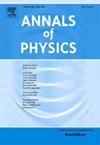压缩热储层增强量子Mpemba效应
IF 3
3区 物理与天体物理
Q2 PHYSICS, MULTIDISCIPLINARY
引用次数: 0
摘要
量子系统可以被指数加速到其定态的现象被称为量子姆潘巴效应(QMpE)。由于它与经典的姆潘巴效应相似,热水比冷水结冰更快,这一现象引起了人们的极大关注。虽然QMpE已经在不同的场景下进行了表征和实验验证,但实现这种现象的充分和必要条件仍在研究中。在本文中,我们通过开放量子系统动力学的一般方法解决了QMpE的一个充分条件。借助本研究中引入的Mpemba参数来量化QMpE的强度,我们讨论了我们的条件如何以稳健的方式预测和解释弱和强QMpE的出现。作为一项应用,通过利用压缩热环境固有的非经典性质,我们展示了当我们的条件满足时,如何有效地诱导增强的QMpE。我们证明,当系统与热储层相互作用时,在挤压存在下,热量子位比冷量子位冻结得更快。我们的研究结果提供了工具和新的见解,为进一步研究量子领域中这种特殊现象的最基本层面开辟了广阔的途径。本文章由计算机程序翻译,如有差异,请以英文原文为准。
Enhanced quantum Mpemba effect with squeezed thermal reservoirs
The phenomenon where a quantum system can be exponentially accelerated to its stationary state has been referred to as the Quantum Mpemba Effect (QMpE). Due to its analogy with the classical Mpemba effect, hot water freezes faster than cold water, this phenomenon has garnered significant attention. Although QMpE has been characterized and experimentally verified in different scenarios, the sufficient and necessary conditions to achieve such a phenomenon are still under investigation. In this paper, we address a sufficient condition for QMpE through a general approach for open quantum system dynamics. With the help of the Mpemba parameter introduced in this work to quantify how strong the QMpE can be, we discuss how our conditions can predict and explain the emergence of weak and strong QMpE in a robust way. As an application, by harnessing the intrinsic non-classical nature of squeezed thermal environments, we show how enhanced QMpE can be effectively induced when our conditions are met. We demonstrate that when the system interacts with thermal reservoirs, a hot qubit freezes faster than a cold qubit in the presence of squeezing. Our results provide tools and new insights, opening a broad avenue for further investigation at the most fundamental levels of this peculiar phenomenon in the quantum realm.
求助全文
通过发布文献求助,成功后即可免费获取论文全文。
去求助
来源期刊

Annals of Physics
物理-物理:综合
CiteScore
5.30
自引率
3.30%
发文量
211
审稿时长
47 days
期刊介绍:
Annals of Physics presents original work in all areas of basic theoretic physics research. Ideas are developed and fully explored, and thorough treatment is given to first principles and ultimate applications. Annals of Physics emphasizes clarity and intelligibility in the articles it publishes, thus making them as accessible as possible. Readers familiar with recent developments in the field are provided with sufficient detail and background to follow the arguments and understand their significance.
The Editors of the journal cover all fields of theoretical physics. Articles published in the journal are typically longer than 20 pages.
 求助内容:
求助内容: 应助结果提醒方式:
应助结果提醒方式:


